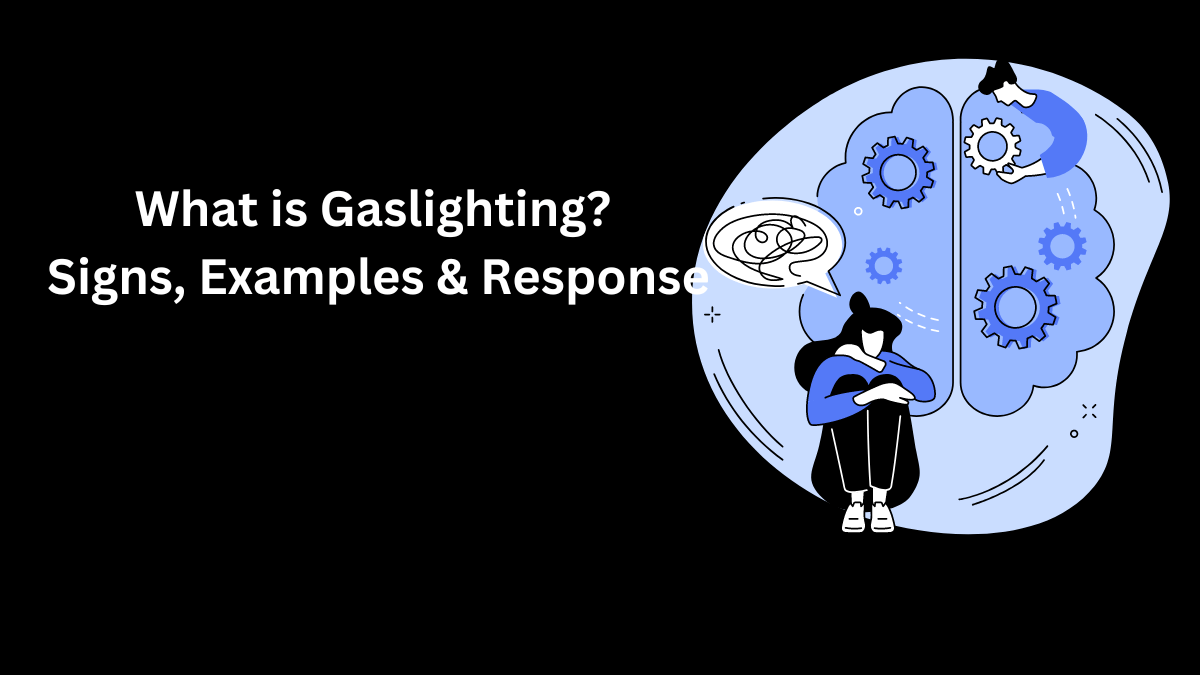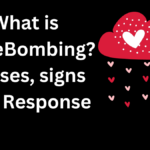The term “Gaslighting” comes from the 1938 play “Gas Light,” in which a husband tries to convince his wife that she is going insane by dimming the lights in their home (which were powered by gas) and then denying that they have changed. The play popularized the concept of gaslighting and the practice has since been recognized as a form of psychological abuse.
The concept of Gaslighting has been applied to the behavior of narcissistic People, who use manipulation and deceit to maintain power and control in their relationships.
What is Gaslighting?
Gaslighting is a form of psychological manipulation in which a person seeks to sow seeds of doubt in someone else, making them question their own memory, perception, or sanity. In the context of narcissism, Gaslighting can be used as a tool by narcissistic people to control and dominate their partners or victims.
“Gaslighting is an attempt to change someone’s perception of reality.”
Fahim Chughtai
Gaslighting in narcissistic relationships is a form of emotional manipulation and psychological abuse whereby an individual with narcissistic traits or behaviors seeks to control the thoughts, beliefs, and perceptions of another person. This type of abuse is often used to undermine the other person’s self-esteem and personal autonomy, leaving them feeling confused and disempowered.
Signs of Gaslighting
1. Constant doubt
You feel as if you are constantly second-guessing yourself and your perceptions of reality.

Constant doubt is a common sign of gaslighting in a relationship with a narcissist. The Narcissist manipulator will make their victim question their own perceptions, memories, and even sanity through deceitful means.
This can include denying events that took place, manipulating facts, and playing mind games to sow confusion and insecurity in the victim. As a result, the victim may begin to second-guess themselves, causing a breakdown in their sense of self and a loss of confidence.
“Gaslighting is a distorted alternate reality.”
Tracy Malone
This constant doubt can leave the victim feeling as if they cannot trust their own thoughts and feelings, causing them to rely more on the manipulator for validation and support. This dependence can then lead to a toxic and abusive relationship dynamic.
2. Isolation
Your Narcissist manipulator may try to isolate you from friends, family, or other sources of support, making you more dependent on them.

The Narcissist manipulator may try to separate their victim from friends, family, and other sources of support in order to make them more dependent on the manipulator.
This can be achieved through tactics such as cutting off communication with others, discouraging the victim from seeking outside help, or making the victim feel ashamed or embarrassed about their experiences.
Gaslighting can manifest in both subtle ways and more overt ways, such as by denying something has happened, shifting blame for one’s own behavior onto the victim, playing mind games, withholding information that would benefit the victim, or manipulating facts so that they are skewed in favor of the abuser.
As a result, the victim may become increasingly isolated and lonely, making them more vulnerable to the manipulator’s control and manipulation. The isolation can also make it more difficult for the victim to leave the relationship, as they may feel like they have nowhere to turn for help.
3. Denial of events
Your Narcissist manipulator denies that certain events took place, causing you to question your own memories.
The Narcissist manipulator will deny that certain events took place, even if there is evidence to the contrary. This can include denying things they said, things they did, or even things that are clearly established as fact.
The goal of this denial is to make the victim question their own memories and perceptions, causing them to doubt their own recollection of events. Over time, the constant denial can cause the victim to become unsure of themselves, leading to a breakdown in their sense of reality and a loss of confidence.
The manipulator can then use this confusion and insecurity to control and manipulate the victim, leading to a toxic and abusive relationship dynamic.
4. Manipulation of facts
The Narcissist manipulator may twist facts and manipulate information to make you doubt your own perceptions.
The manipulator will twist facts and manipulate information in order to make the victim question their own perceptions and memories. For example, they may deny something that the victim knows to be true, or they may present false information as if it were true.
The goal of this manipulation is to make the victim feel unsure of themselves, causing them to rely more on the manipulator for validation and support.
It can be difficult for victims to recognize when they’re being gaslighted because it often occurs gradually over time. The abuser’s tactics may include lying, shaming or belittling their partner’s feelings or experiences, constantly shifting goalposts on important issues, making requests that always seem out of reach no matter how hard the victim works to meet them or isolating them from friends and family members who could potentially support them.
Over time, the constant manipulation can cause the victim to lose touch with reality and their own sense of truth, leading to a breakdown in their sense of self and a loss of confidence.
This manipulation can result in the victim becoming more submissive and giving control to the gaslighter, leading to an abusive and toxic relationship dynamic.
5. Blaming
You are constantly being blamed for things that aren’t your fault, leading to a feeling of inadequacy and insecurity.
Blaming is a common tactic used by narcissistic individuals in gaslighting relationships. The manipulator will constantly place blame on the victim for things that aren’t their fault, making the victim feel inadequate and insecure.
This blaming can take the form of criticizing, complaining, or finding fault with the victim’s actions or decisions.
The goal of this blaming is to make the victim feel as if they are the problem, causing them to question their own abilities and self-worth.
Over time, the constant blaming can cause the victim to internalize their feelings of inadequacy, leading to a breakdown in their sense of self and a loss of confidence.
The manipulator can then use this insecurity to control and manipulate the victim, leading to a toxic and abusive relationship dynamic.
6. Trivializing
The Narcissist manipulator may dismiss your thoughts, feelings, and experiences as trivial or unimportant.
Trivializing is a common tactic used by narcissistic individuals in gaslighting relationships. The manipulator will dismiss their victim’s thoughts, feelings, and experiences as trivial or unimportant, invalidating their victim’s emotions and experiences.
This trivializing can take the form of belittling, condescension, or ignoring the victim’s concerns. The goal of this trivializing is to make the victim feel as if their emotions and experiences are not valid or worth considering, causing them to question their own worth and value.
Over time, the constant trivializing can cause the victim to feel unimportant and insignificant, leading to a breakdown in their sense of self and a loss of confidence. The manipulator can then use this insecurity to control and manipulate the victim, leading to a toxic and abusive relationship dynamic.
7. Projection
Your manipulator may project their own faults onto you, causing you to feel as if you are the one with the problem.
Projection is a common tactic used by narcissistic individuals in gaslighting relationships. The manipulator will project their own negative traits, behaviors, and emotions onto the victim, making the victim feel responsible for the manipulator’s actions and behaviors.
For example, the manipulator may accuse the victim of being selfish, controlling, or manipulative, when in reality it is the manipulator who displays those traits. The goal of this projection is to deflect blame and responsibility away from the manipulator and onto the victim, causing the victim to question their own actions and behaviors.
Research suggests that gaslighting in narcissistic relationships is particularly common among individuals who have certain personality traits such as lack of empathy and difficulty managing emotions. In addition, people with a history of childhood trauma may be more vulnerable to experiencing this type of manipulation due to their lower self-esteem and weaker sense of self-worth.
Over time, the constant projection can cause the victim to internalize the manipulator’s negative traits and become more self-critical, leading to a breakdown in their sense of self and a loss of confidence.
The manipulator can then use this insecurity to control and manipulate the victim, leading to a toxic and abusive relationship dynamic.
8. Breaking promises
Your manipulator makes promises they don’t keep, leaving you feeling let down and unsupported.
The manipulator will repeatedly make promises that they do not keep, causing the victim to question the reliability of the manipulator and their own ability to trust. The goal of this is to make the victim feel uncertain and unsure, causing them to become more dependent on the manipulator for stability and security.
The manipulator may also use broken promises as a means of control, using the threat of breaking a promise to manipulate the victim into complying with their demands.
Over time, the constant breaking of promises can cause the victim to feel frustrated, angry, and let down, leading to a breakdown in the trust and communication in the relationship. The manipulator can then use this uncertainty to control and manipulate the victim, leading to a toxic and abusive relationship dynamic.
9. Insinuating
The manipulator may imply that you are crazy, making you feel like you can’t trust your own thoughts and feelings.
The manipulator will make indirect, vague, or ambiguous statements that suggest something negative about the victim, but do so in a way that allows the manipulator to deny any wrongdoing if called out.
For example, the manipulator may make a remark that implies the victim is not intelligent, or that they are not capable of making good decisions. The goal of this insinuating is to make the victim feel unsure of themselves, causing them to question their own abilities and self-worth.
Over time, the constant insinuations can cause the victim to internalize the negative messages, leading to a breakdown in their sense of self and a loss of confidence. The manipulator can then use this insecurity to control and manipulate the victim, leading to a toxic and abusive relationship dynamic.
Examples of Gaslighting
1. A wife who is constantly belittling her husband in public, saying things like “he’s too sensitive” or “he’s not successful enough” or “he doesn’t measure up to my standards”. Her intention is to make him feel small and unimportant so she can have control over their relationship and her own feelings of inadequacy.
She might even intentionally bring up topics that she knows will provoke an argument, such as politics, religion, or money.
2. A partner who accuses their significant other of being jealous of them when they show interest in a third party. The goal for this type of gaslighting is to shift the blame away from the perpetrator and onto the victim.
They might say things like “you’re just paranoid” or “I can be friends with whoever I want without you getting jealous,” making it seem like it’s all in the victim’s head instead of being a real issue between the two.
3. An employer who creates a hostile work environment by setting impossible standards for employees that are designed to be unobtainable, thus giving them a reason to always criticize their workers’ performance.
This type of gaslighting serves two purposes: it demeans those who cannot meet their expectations while also allowing them to maintain control over those who do manage to succeed despite all odds.
4. A parent who acts like nothing is wrong when their child expresses feelings of discomfort or distress over something that happened at home or school, brushing off these concerns as if they don’t matter.
This kind of gaslighting silences victims by making them believe that no one cares about what they are going through — furthering an already existing power imbalance between parent and child.
5. A friend who manipulates someone into thinking their opinion on a certain topic does not count because they lack knowledge on it — regardless if this is true or not — then proceeds to tell them what they think should be done instead in order to discredit any potential ideas that the person may have had before hand.
This type of gaslighting works especially well when used against people with low self-esteem as it reinforces doubts about their own worth and potential within society at large.
How Can Gaslighting Affect Your Mental Health?
1. Low self-esteem
2. Depersonalization and derealisation
3. Difficulty making decisions
5. Paranoia and mistrust of others
Gaslighitng and narcissistic parents

In cases involving narcissistic parents, this type of abuse is often used as a means to control and manipulate the child into submission. Narcissistic parents may also use gaslighting as a way to divert attention away from themselves and onto the child, thus reinforcing feelings of inferiority in order to maintain power over them.
The effects of gaslighting can be incredibly damaging for children who are subjected to it; it can lead to low self-esteem, depression, anxiety, and even psychosis if left unchecked. As such, it’s important that adults recognize these signs early so they can intervene before too much damage has been done.
Common Gaslihting phrases
Some common gaslighting phrases include:
- “That never happened.”
- “You’re remembering it wrong.”
- “Are you sure you’re not just imagining things?”
- “I never said that.”
- “You’re being too sensitive.”
- “You’re overreacting.”
- “You’re just making things up.”
- “You’re being paranoid.”
- “You’re crazy.”
Why is Gaslighting dangerous?
Gaslighting is dangerous because it can have serious psychological and emotional consequences for the victim. Over time, the victim may begin to doubt their own perceptions, memories, and even sanity, leading to decreased self-esteem, anxiety, and depression.
Additionally, gaslighting can create a dynamic in which the victim becomes dependent on the abuser for validation and support, making it difficult for them to leave the situation or seek help. The victim may also feel shame, confusion, and isolation, which can further compound the negative effects of gaslighting.
How to deal with Gaslighting?
1. Protect yourself and your emotions by setting boundaries
Communicate with your partner in a respectful, yet assertive way when it comes to situations where you feel like you are being gaslighted. Explain how their behavior is making you feel, and explain why it is not acceptable.
Make sure to be firm and consistent with these boundaries — if they cross them, don’t be afraid to take action such as ending the conversation or leaving the situation altogether.
2. Rely on support from others
Reach out for help from friends and family who can provide emotional support and remind you that you are not alone in this difficult situation. Keeping communication lines open with people who understand what you are going through and will listen without judgment is key to getting through the issue.
Additionally, consider seeking professional counseling or therapy if necessary so that an impartial third party can offer guidance in effectively dealing with this type of relationship dynamic.
3. Practice good self-care
Take care of yourself physically, mentally, and emotionally by engaging in activities that make you feel good about yourself such as physical exercise, meditation or journaling.
Doing so will help keep your mind clear of negative thoughts that can arise when experiencing gaslighting and allow you to focus on building a healthier mental space for yourself within the relationship.
4. Stay mindful of manipulation tactics used by narcissists
Keep in mind common tactics narcissists use to manipulate others such as exaggeration of facts, verbal abuse, blaming others for their own mistakes or shortcomings and avoiding accountability for their actions.
When facing these types of scenarios it is important to stay aware of what conversations are taking place in order to avoid falling victim to any potential manipulation tactics being used against you by your partner.
5. Speak up
Refuse to accept any behavior which makes you uncomfortable — it is important to never let anyone else dictate how you should feel about something or try to convince you that your feelings are invalid or wrong somehow without providing any logical evidence for why this might be true.
If your partner tries convincing you otherwise then don’t be afraid to stand up and state your opinion firmly but calmly while also expressing why their own point of view might not always be correct either — doing so allows both parties involved a chance at having an honest discussion free from hostile intentions or manipulation attempts on either side.
6. Question your internal dialogue
Be mindful of how often certain statements or thoughts come up during conversations with your narcissistic partner — ask yourself if these thoughts could potentially originate from a place of doubt generated by gaslighting rather than genuine conviction or belief in the idea being presented?
By questioning the validity behind some of these ideas it allows us to maintain control over our own thought process rather than allowing someone else’s words/actions influence us without proper understanding first-hand .
7 . Document everything
Keeping records (written notes, audio/video recordings etc.) can help serve as concrete proof should there ever need to be an argument made against any accusations stemming from gaslighting within the relationship .
Doing so also serves as a useful reminder whenever doubts start creeping into our minds , helping us realize that we are not ‘crazy’ for believing what we know about our experiences — even if someone else may try telling us otherwise .
8 . Find ways to regain control over conversations
It’s easy for conversations between partners suffering from gaslighting dynamics become one-sided very quickly , leaving one person feeling unheard or disrespected as a result .
In order find some degree of balance again within these discussions , practice active listening skills (e .g., paraphrasing , summarizing , asking questions ) while ensuring that each person gets an equal opportunity at speaking — doing so allows both parties involved an opportunity at properly understanding one another while decreasing chances anger / resentment arising due miscommunication occurring between them later down the line .
Last words
If you find yourself in a relationship with someone who is gaslighting you, it can be difficult to know what to do. However, remember that you are not alone and there is help available. Talk to a trusted friend or family member about your experiences and consider seeking professional help to address the situation. With support, you can begin to rebuild your confidence and develop healthy relationships founded on trust and respect.


